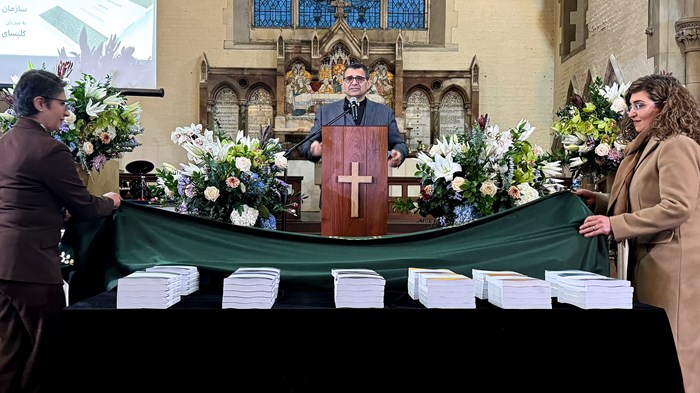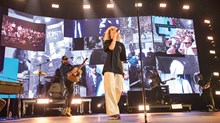
Home to the world’s fastest-growing church, with up to an estimated 1 million Christians, Iran has many underground fellowships that had previously worshiped in the Farsi language. But according to a 1991 survey of new mothers in Iran, only 46 percent reported Farsi as their mother tongue.
Minority Gilaki, Mazandarani, and other citizens can now read the New Testament in their own language, thanks to the publication of 12 new Bible translations. Far from a Persian monolith, Iran has 62 distinct languages, according to the Korpu translating agency, 9 of which number more than 1 million speakers.
And God’s concern for Iran goes beyond their individual souls.
“Translating the Bible is God’s way not simply to save people,” said Yashgin, a Korpu exegete-in-training, “but to return glory to humiliated minority peoples.”
Now living in Turkey and a Christian since 2007, Yashgin requested anonymity to protect her believing family back in Shiraz, 525 miles south of Tehran. A member of the Qashqai Turkic minority of Iran, she fled the country after two brief detentions in jail for her faith, connecting with Korpu in 2017.
Seven years later, she helped birth the first Qashqai New Testament.
Yashgin said she was mocked as a child over her accent and Turkish name. (Minority Rights Group (MRG) states that Iran represses its minority languages, mandating Farsi alone in education and civil affairs.) But studying the Bible, she learned that God called Israel as a minority people (Deut. 7:7), and translation, she said, proves the truth of John 3:16.
God loves the world, not just the majority.
“No one cares for us more than our mother,” Yashgin said. “God showed us he cares also, by speaking her language.”
Language and ethnicity figures are contested in Iran, whose 88 million people reside in a territory roughly the size of Alaska. Slightly more than half speak a variant of Persian, with Azeris and Kurds as the largest minority ethnic groups.
Local Armenian and Assyrian Christians have long had their own Scriptures. The first Kurdish Bible was published in 1872, and an Azeri Bible was published in 1891. While the first reference to a Persian translation dates back to the fourth century with archbishop of Constantinople John Chrysostom, fifth-century manuscript evidence was found in a Nestorian monastery in Chinese Tajikistan.
Missionary Henry Martyn led the first modern version, completed in 1846.
But while missionaries were exceptional in their geographic reach, said Lazarus Yeghnazar, founder of Transform Iran, they established Farsi-speaking congregations even in regional capitals. His church planting organization has congregations in over 50 Iranian cities, he said, and seeks to reverse this ethnic neglect.
Working with unfoldingWord’s Open Bible Stories, Transform Iran has used regional accents to orally translate key biblical episodes in 22 minority languages, set to a background of local folk instrumentation. Few minority Iranians can read their mother tongue, he said, many of which experts fear are at risk of disappearing.
“When they hear their music, it touches their soul,” said Yeghnazar, an ethnic Armenian. “If Jesus delays his return, they will say: Christians preserved our culture.”
An ethnic Azeri agrees—while recognizing the political implications.
Feridoon Mokhof, director of Korpu, said that Iran wrongly sees the spirit of nationalism behind ethnic desires to use their native speech. The logic goes like this: A language implies a people, a people implies a nation, a nation implies land, and a land implies separatism. MRG states that language activists in Iran have been imprisoned or exiled.
When Korpu translators are arrested, Mokhof said, it is often due to their being seen as a threat to national security. Adding Arabic as an official religious language after its 1979 revolution, the Islamic Republic has largely continued the earlier government policy to suppress ethnic identities. But they have also disturbed relations that had previously been cordial and historical.
The Bible speaks of the Persian King Xerxes’ 127 satraps, with central authority in Susa—where the Lak people live today. And King Cyrus governed biblical Elam—where the Lur people reside. Both these languages now have a New Testament—possession of which, Mokhof said, is a basic human right.
“The Lur don’t need their own country, but their language and culture should be preserved in their own community,” he said. “The Bible is the only literature that can keep it.”
Mokhof became a Christian in 1974 as a university student and began his linguistic career in 1990, translating the Bible into his native southern Azeri. Five years later, the Azerbaijan Bible Society was founded across Iran’s northwestern border in Baku to work on the northern Azeri translation, while he founded Korpu—which means “bridge” in Azeri.
It was always his goal that the Bible would connect peoples.
In 1998, Mokhof began translating the New Testament into Gilaki, with Mazandarani and Luri following a few years later. But much of this work was put on hold until the southern Azeri Scriptures were finished in 2014. Thereafter, Korpu began work in Talysh, Tati, Ahwazi Arabic, and others, with the finished 12 New Testaments dedicated in a London presentation last weekend.
Six more translations are scheduled to be published in June.
Working with United Bible Societies (UBS), Seed Company, Operation Mobilization, and the Southern Baptist Convention’s International Mission Board, Korpu employs 73 staff including 58 translators, two-thirds of whom work from inside Iran. Mokhof is also the assistant superintendent of the Hamgaam Council of United Iranian Churches, which oversees 850 house churches in Iran. Several are located in minority areas.
Where security permits, translators check their work with friends and relatives in Iran. This can open opportunities for evangelism, and Yashgin said one friend of hers believed after hearing the gospel in Qashqai, having rejected it years earlier in Farsi.
“When you speak of Christianity in Iran, their first thought is that it is a Western religion,” she said. “Hearing the Bible in one’s mother tongue proves this is a false idea.”
But until now, Mokhof said that house churches—which largely match the ethnic composition of the nation—relied on Farsi Scriptures. Following the Islamic Revolution, Christianity exploded first in Tehran, the Farsi-dominated cosmopolitan and culturally open capital. It then took about 10–15 years for satellite television to widen the revival to the ethnic peripheries.
Prior to persecution dividing believers into smaller family-based units for safety, Yashgin’s congregation was originally mixed Farsi-Qashqai. Although her believing grandmother understood the national language, she would translate the Bible orally to help it resonate better. But as people from across Iran have fled into Turkey, church is once again a multiethnic assembly—with Farsi central.
As it is for scattered Iranians everywhere.
“We don’t use labels, which helps our national unity,” said Nahid Sepehri, executive director of the Iranian Bible Society in Diaspora (IBSD), referring to the Iranian Church in London and similarly named churches elsewhere. “But if other ethnicities want to worship in their own language also, why not?”
She has not heard of any diaspora congregation that is ethnically unique, but the IBSD will partner with Korpu to get these translations to any who need it. They currently distribute 300,000 Scripture copies a year, cooperating with national Bible societies aware of the Iranian diaspora. Elsewhere they ship literature to less-developed countries, or hand carry it to less-friendly regimes.
The IBSD was founded in 2015, growing out of a UBS-sponsored project to translate Today’s Persian Version into contemporary Farsi. Finished in 2007, a revised edition was finalized last year. And with the completion of 12 new ethnic New Testaments, Korpu will discern the local desire for the entire Bible. Under current resource commitment, Qashqai speakers and others will have the whole counsel of God within three years.
Should freedom come to Iran, which language will they choose for church? Yashgin said while both models are good, monocultural service yields more intimacy while mixed groups nurture wider fellowship. She hopes that Iran will permit local language education, yet she recognizes the need for a uniting identity.
“Translation fulfills Colossians 3:11—‘Here there is no Gentile or Jew … but Christ is all, and is in all,’” Yashgin said. “But I am also an Iranian, and the only difference is my language.”

Support Our Work
Subscribe to CT for less than $4.25/month


















